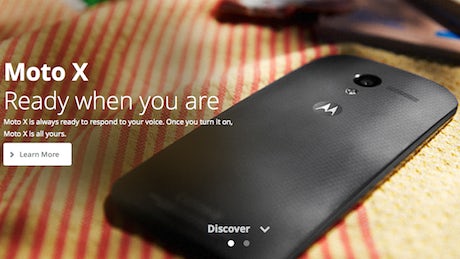Google sells Motorola to Lenovo
Google has sold Motorola Mobility, the company it acquired less than two years ago for $12.5bn, to Chinese computer firm Lenovo for $2.9bn – a decision that highlights the search giant’s original purchase was driven by Motorola’s vast patent portfolio.

Lenovo says the agreement will “significantly strengthen” Lenovo’s position in the smartphone market and help it gain a foothold in regions such as Western Europe, North America and Latin America, where Motorola has “strong carrier and retailer relationships”.
Motorola has a 0.3 per cent market share of the smartphone market in Western Europe, a 3.5 per cent share of the North American market and a 8 per cent share of the smartphone sales in Latin America according to IDC data for the fourth quarter of 2012 to the third quarter of 2013.
Lenovo will receive more than 2,000 patent assets as well as the global Motorola Mobility brand and trademark portfolio.
Google will maintain ownership of the majority of Motorola’s patent portfolio, including current applications, but Lenovo will also receive a license to the portfolio and other intellectual property.
Yang Yuanqing, CEO and chairman of Lenovo, says: “The acquisition of such an iconic brand, innovative product portfolio and incredibly talented global team will immediately make Lenovo a strong competitor in smartphones. We will immediately have the opportunity to become a strong global player in the fast-growing mobile space.”
Lenovo says it has a “proven track record” of embracing and strengthening brands – as it did with its purchase of the IBM computer business in 2005, which helped it quickly accelerate to become the third largest computer maker by volume.
In a presentation to investors, Lenovo outlines the acquisition is “well aligned with Lenovo’s ‘Protect and Attack’ strategy” – as it “protects” its China, commercial PC and profit pools and “attacks” the consumer PC, mobile internet and digital home and enterprise systems markets.
Larry Page, Google CEO, says: “This move will enable Google to devote our energy by driving innovation across the Android ecosystem, for the benefit of smartphone users everywhere.”
The statement from Page also suggests conflicts of interest with other Android licnesees – such as Samsung, HTC and LG – may have led to Google’s decision. The Motorola Mobility unit has also mounted a series of quarterly losses since it was acquired by Google.
Earlier this month Motorola announced the European launch of its flagship smartphone the Moto X, which it hopes will build on the sales success of its predecessor the Moto G in the region.
The Lenovo acquisition is still subject to approval from Chinese and US regulators.
Geoff Blaber, mobile device software research analyst at CCS Insight, says the acquisition gives Lenovo an “established brand” and that Motorola’s reach in North and Latin America “dovetails nicely” with the success of the Lenovo brand in Asia.
He adds: “This is a hugely significant development and underlines the seismic shifts the mobile industry has seen in three years. Lenovo turned its acquisition of IBM’s ThinkPad business into a dominant position in a cutthroat PC market. It faces very different dynamics in smartphones, but it has already achieved considerable success in China. The acquisition will allow it to diversify into Western markets and fulfil its ambition of becoming a 100 million unit smartphone business.”






